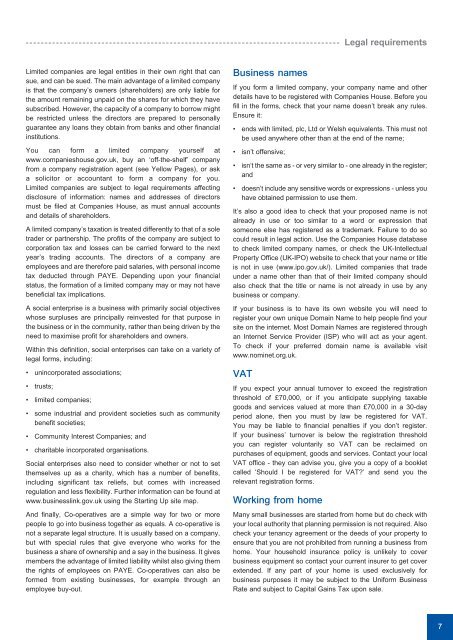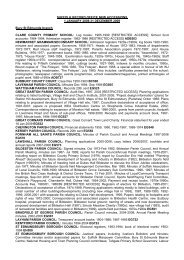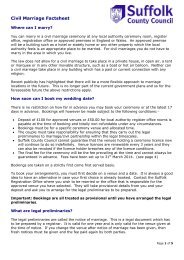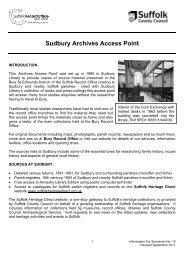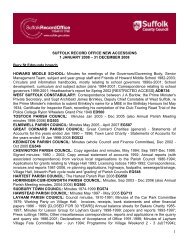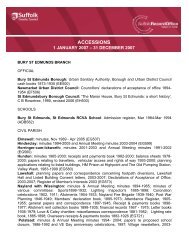starting and growing small business suffolk 06 12 11
starting and growing small business suffolk 06 12 11
starting and growing small business suffolk 06 12 11
- No tags were found...
Create successful ePaper yourself
Turn your PDF publications into a flip-book with our unique Google optimized e-Paper software.
Legal requirementsLimited companies are legal entities in their own right that cansue, <strong>and</strong> can be sued. The main advantage of a limited companyis that the company’s owners (shareholders) are only liable forthe amount remaining unpaid on the shares for which they havesubscribed. However, the capacity of a company to borrow mightbe restricted unless the directors are prepared to personallyguarantee any loans they obtain from banks <strong>and</strong> other financialinstitutions.You can form a limited company yourself atwww.companieshouse.gov.uk, buy an ‘off-the-shelf’ companyfrom a company registration agent (see Yellow Pages), or aska solicitor or accountant to form a company for you.Limited companies are subject to legal requirements affectingdisclosure of information: names <strong>and</strong> addresses of directorsmust be filed at Companies House, as must annual accounts<strong>and</strong> details of shareholders.A limited company’s taxation is treated differently to that of a soletrader or partnership. The profits of the company are subject tocorporation tax <strong>and</strong> losses can be carried forward to the nextyear’s trading accounts. The directors of a company areemployees <strong>and</strong> are therefore paid salaries, with personal incometax deducted through PAYE. Depending upon your financialstatus, the formation of a limited company may or may not havebeneficial tax implications.A social enterprise is a <strong>business</strong> with primarily social objectiveswhose surpluses are principally reinvested for that purpose inthe <strong>business</strong> or in the community, rather than being driven by theneed to maximise profit for shareholders <strong>and</strong> owners.Within this definition, social enterprises can take on a variety oflegal forms, including:• unincorporated associations;• trusts;• limited companies;• some industrial <strong>and</strong> provident societies such as communitybenefit societies;• Community Interest Companies; <strong>and</strong>• charitable incorporated organisations.Social enterprises also need to consider whether or not to setthemselves up as a charity, which has a number of benefits,including significant tax reliefs, but comes with increasedregulation <strong>and</strong> less flexibility. Further information can be found atwww.<strong>business</strong>link.gov.uk using the Starting Up site map.And finally, Co-operatives are a simple way for two or morepeople to go into <strong>business</strong> together as equals. A co-operative isnot a separate legal structure. It is usually based on a company,but with special rules that give everyone who works for the<strong>business</strong> a share of ownership <strong>and</strong> a say in the <strong>business</strong>. It givesmembers the advantage of limited liability whilst also giving themthe rights of employees on PAYE. Co-operatives can also beformed from existing <strong>business</strong>es, for example through anemployee buy-out.Business namesIf you form a limited company, your company name <strong>and</strong> otherdetails have to be registered with Companies House. Before youfill in the forms, check that your name doesn’t break any rules.Ensure it:• ends with limited, plc, Ltd or Welsh equivalents. This must notbe used anywhere other than at the end of the name;• isn’t offensive;• isn’t the same as - or very similar to - one already in the register;<strong>and</strong>• doesn’t include any sensitive words or expressions - unless youhave obtained permission to use them.It’s also a good idea to check that your proposed name is notalready in use or too similar to a word or expression thatsomeone else has registered as a trademark. Failure to do socould result in legal action. Use the Companies House databaseto check limited company names, or check the UK-IntellectualProperty Office (UK-IPO) website to check that your name or titleis not in use (www.ipo.gov.uk/). Limited companies that tradeunder a name other than that of their limited company shouldalso check that the title or name is not already in use by any<strong>business</strong> or company.If your <strong>business</strong> is to have its own website you will need toregister your own unique Domain Name to help people find yoursite on the internet. Most Domain Names are registered throughan Internet Service Provider (ISP) who will act as your agent.To check if your preferred domain name is available visitwww.nominet.org.uk.VATIf you expect your annual turnover to exceed the registrationthreshold of £70,000, or if you anticipate supplying taxablegoods <strong>and</strong> services valued at more than £70,000 in a 30-dayperiod alone, then you must by law be registered for VAT.You may be liable to financial penalties if you don’t register.If your <strong>business</strong>’ turnover is below the registration thresholdyou can register voluntarily so VAT can be reclaimed onpurchases of equipment, goods <strong>and</strong> services. Contact your localVAT office - they can advise you, give you a copy of a bookletcalled ‘Should I be registered for VAT?’ <strong>and</strong> send you therelevant registration forms.Working from homeMany <strong>small</strong> <strong>business</strong>es are started from home but do check withyour local authority that planning permission is not required. Alsocheck your tenancy agreement or the deeds of your property toensure that you are not prohibited from running a <strong>business</strong> fromhome. Your household insurance policy is unlikely to cover<strong>business</strong> equipment so contact your current insurer to get coverextended. If any part of your home is used exclusively for<strong>business</strong> purposes it may be subject to the Uniform BusinessRate <strong>and</strong> subject to Capital Gains Tax upon sale.7


